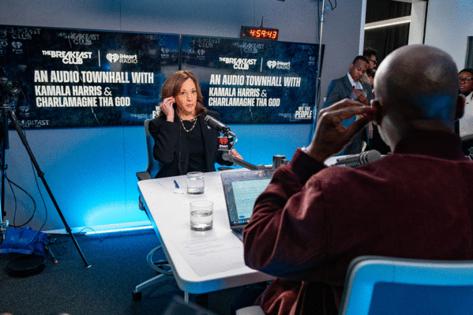Commentary: Democrats must take a new media approach
Published in Op Eds
In the final month of Vice President Kamala Harris’ 2024 presidential campaign, she appeared on several so-called “nontraditional” media shows. Most notably, Alex Cooper’s “Call Her Daddy” podcast, centered around women’s issues. She also made rounds on other radio and podcast shows, including with Howard Stern, Charlamagne tha God, “Club Shay Shay” and more.
The Harris campaign’s new media strategy was clear: In an age of different kinds of media, the Harris campaign sought to reach as many people as possible. At first blush, the strategy was not wrong.
Despite all the podcasts and radio shows that Harris went on, however, Harris still fell short of winning the election. It was not because Harris did not understand the imperative of moving beyond traditional news sources. Nor was it because the new media outlets Harris went on did not matter — indeed, each show appeals to a unique and distinct audience that may have helped Harris.
Instead, Harris fell short because competing in today’s media environment requires not only consistently stepping into Republican-controlled media environments, but also being bold and aggressive while doing so. Aside from an interview on Fox News with Bret Baier — during which Harris proved herself to be capable at answering hostile questions — the Harris campaign spent most of its time on the shows it wanted to engage with, rather than shows with which it needed to engage. Put simply, the Harris campaign minimized its risks. In this election, that strategy fell short.
To be sure, it is plausible that the Harris campaign’s decision to engage with friendlier shows was strategic from its perspective. For one, Harris had limited time. She had only 107 days to introduce herself to the nation and couldn’t engage with every type of media, while also traveling the nation meeting with voters and rallying large crowds. The Harris campaign could have also felt that, because Harris is a woman of color — which leads to heightened media scrutiny of any mishap or stumble — playing it safe was the best option. In other words, if Harris could minimize errors, she could minimize room for scrutiny, and, ultimately, she could minimize any negative shifts in the polling.
But given the results of this election, it is clear Democrats can learn many lessons from the Harris campaign’s new media approach.
Already, there are signs that Democrats are thinking more about how to compete in today’s information ecosystem. For instance, many pundits and commentators are urging Democrats to create an entirely new information ecosystem infrastructure for how their message is disseminated. And it makes sense: Franklin D. Roosevelt controlled the radio, Ronald Reagan mastered television, Barack Obama’s campaign aligned with the advent of modern social media, and Donald Trump, of course, harnessed the power of Fox News, Twitter and alternative media platforms.
Unlike previous presidents and candidates, however, Democrats do not have complete control over a medium of communication anymore. Take, for instance, podcasts and radio — the most popular shows have a Republican bent. The most popular cable network remains Fox News. State and local media are slowly being sold to Republican-leaning owners. Republicans have spent decades building a robust, comprehensive and effective information ecosystem — and it paid off in this election.
But this reality does not mean Democrats have to create a wholly new information ecosystem. Instead, Democrats can start by leaning into something Republicans leaned into: going on podcasts and shows earlier and more consistently, while conveying a specific, tangible and meaningful message and not being afraid to push back on Republican narratives.
Fortunately, there are Democrats who have started to do this. Pete Buttigieg is widely regarded as being the Democrat who goes on Fox News, setting the record straight and delivering the Democratic message to a mostly Republican audience. Others in the Democratic Party, including Gavin Newsom, have also ventured into new spaces and territories where Democrats do not typically show up.
Make no mistake: These engagements matter. Not only do they allow Democrats to reach an audience that hears a narrative of male victimhood, skepticism toward government and institutions, and casual racism and misogyny, but it also allows viewers and listeners to see a different, more authentic version of Democrats in office and running for it. At a time when voters have declining trust in elected officials, sitting down for a two- to three-hour interview would allow Democrats to showcase a more human side of them.
In today’s information ecosystem, Democrats can’t afford to simply go on the shows they want to engage in or select the friendliest outlets. Going forward, Democrats need to enter new spaces. Democrats need to demonstrate that they aren’t afraid to fight and challenge narratives.
Democrats need to be proud of their party and the accomplishments for the working class and issues that matter to most Americans.
With four years until the next Election Day, Democrats have the time to start changing narratives. They have the time to start resisting dangerous Republican policies to a new audience. They have the time to showcase a party that actually appeals to most Americans. Only then can we start competing with Republicans — and win national elections again.
____
Victor Shi most recently worked on the Kamala Harris-Tim Walz presidential campaign. Previously, he worked on presidential, congressional and mayoral campaigns and was elected as the youngest Joe Biden delegate in 2020.
___
©2024 Chicago Tribune. Visit at chicagotribune.com. Distributed by Tribune Content Agency, LLC.




























































Comments